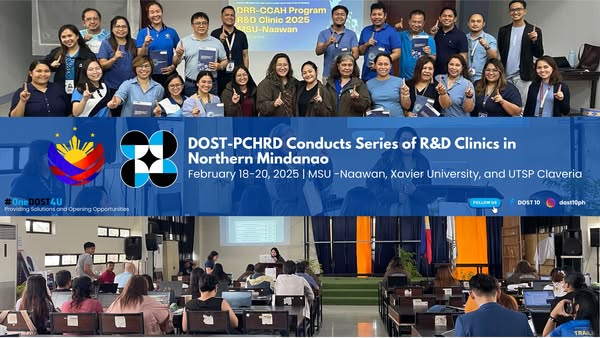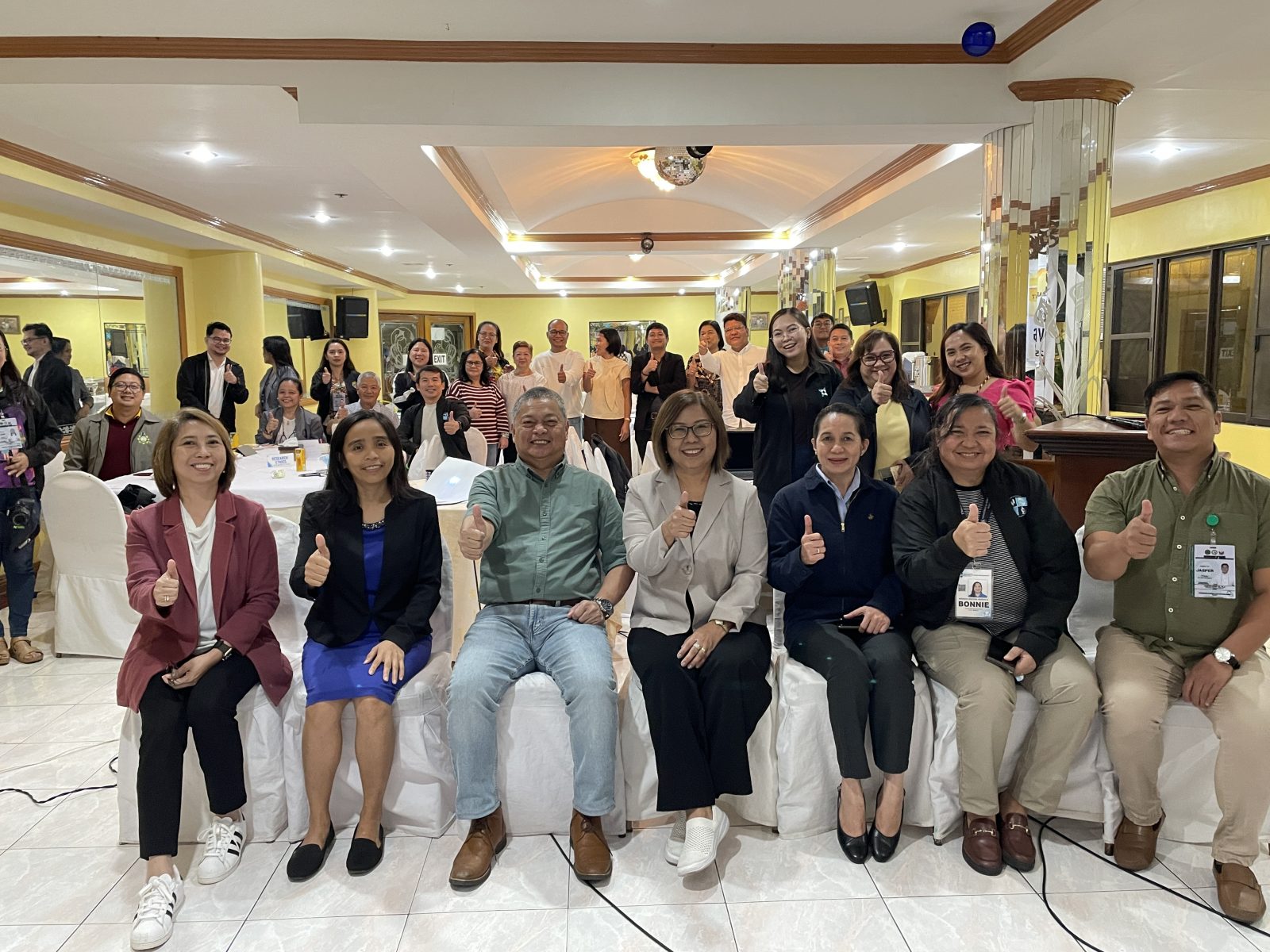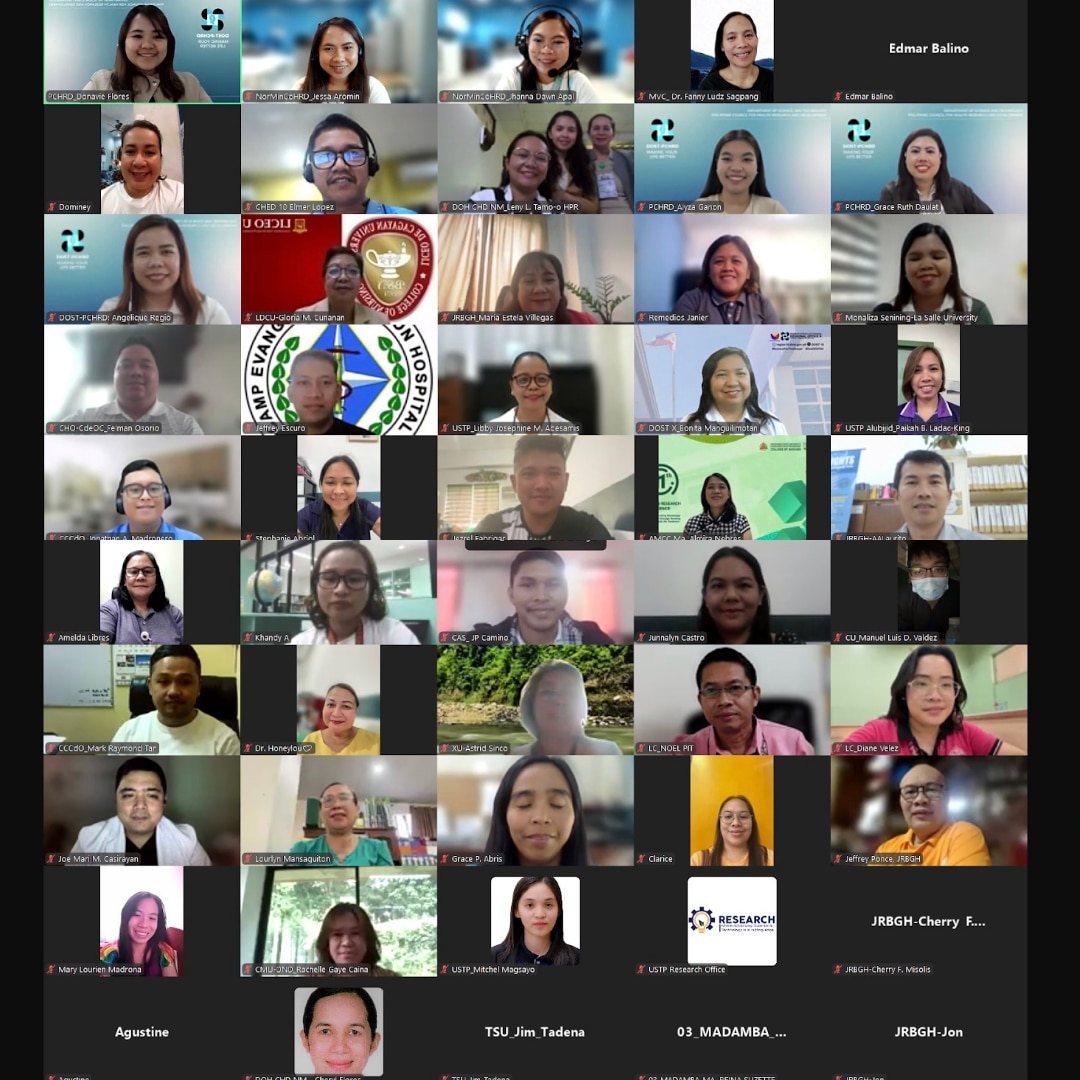Countries around the world are working non-stop to find a cure and come up with appropriate and effective interventions against the COVID-19 pandemic. In the frontline of all these work on COVID-19 is health research and health researchers — understanding the virus, developing vaccines and possible treatments, and generating evidence to support policymaking.
In the Philippines, the Philippine National Health Research System (PNHRS) is at the center of all COVID-19 efforts. The System, through its implementing institutions — Department of Health (DOH), Department of Science and Technology (DOST), Commission on Higher Education (CHED) and the University of the Philippines Manila (UPM), has been working at all fronts providing the much needed R&D, human resources, and evidence-based support to the Philippine Government.
The PNHRS, to date, has already supported a number of R&D programs and put in place platforms to help curb COVID-19.
COVID-19 Tracker
The DOH launched the COVID-19 Tracker in line with its commitment to promote transparency and accountability. The tracker features information on the epidemiology of COVID-19 in the country, COVID-19 testing, health facilities, and availability of personal protective equipment (PPEs). The public can view data on the laboratory testing capacities of the DOH-accredited laboratories including the total number of tests and unique individuals tested. Likewise, the public gets a snapshot of the health system’s capacity in responding to the pandemic based on data collected from the DOH DataCollect application.
The DataCollect app gathers daily data from hospitals and stakeholders such as essential resources and supplies, availability of hospital beds, isolation rooms, ICU beds and mechanical ventilators, and human resource needs. The application can also accurately calculate the projected need of PPEs, and link to logistics offices for delivery of supplies.
SOLIDARITY Treatment Trial
To compare the effects of major COVID-19 treatment outcomes among hospitals globally, the World Health Organization (WHO) organized a solidarity treatment trial aimed at unifying efforts to assess any effects and provide reliable estimates of these treatments on COVID-19 cases. As one of the participating countries, the Philippines is conducting a study among 24 hospitals from Luzon, Visayas, and Mindanao. The study will test the safety and effectiveness of four repurposed drugs in treating COVID-19 compared to the standard of care being practiced in all participating hospitals.
The project is expected to provide evidence-based clinical practice guidelines for the care of COVID-19 patients and, eventually, provide evidence-based medicine against the virus. Funded by the Department of Science and Technology through the Philippine Council for Health Research and Development (DOST-PCHRD), the project has been approved for implementation last April 11, 2020 and has started enrolling patients.
Transmission patterns of COVID-19
To help policymakers create better and evidence-based strategies in addressing the COVID-19 pandemic, researchers from the Research Institute for Tropical Medicine (RITM) led by Dr. Mayan U. Lumandas are investigating the coronavirus transmission patterns among confirmed cases and their contacts in the country.
The DOST-PCHRD-funded study will use RITM samples in its aim to supply the DOH useful data which can improve national efforts in case isolation, contact tracing, and disease control and prevention.
VCO as possible treatment for COVID-19
Another DOST-PCHRD-funded project entitled, “In-vitro Study on the Efficacy of Lauric Acid and its Derivatives against SARS-CoV-2,” aims to test whether certain coconut oil components, such as lauric acid, can diminish or prevent the infectivity of SARS-CoV2, the virus that causes COVID-19.
The project is a partnership between Ateneo de Manila University (AdMU) led by Dr. Fabian M. Dayrit and the Duke-National University of Singapore (Duke-NUS). Results will be used for further studies.
COVID-19 Test Kits
To equip the country with accessible and affordable COVID-19 testing, Dr. Raul V. Destura of the Manila HealthTek Inc., in collaboration with the Philippine Genome Center (PGC), UPM – National Institutes of Health (UPM-NIH) and DOST-Philippine Council for Health Research and Development (DOST-PCHRD), led the development of the GenAmplifyTM Corona Virus Disease-2019 (COVID-19) rRT-PCR Detection Kit.
The locally developed test kit can detect the 2019 novel coronavirus or SARS-CoV-2 with high specificity and efficiency by utilizing a one stop-multiplex real-time polymerase chain reaction (PCR) platform at a significantly cheaper price than its foreign counterparts. Currently, the team is working for the production and distribution of 26,000 tests to hospitals in and outside Metro Manila for field implementation.
Last April 20, 2020, the Manila HealthTek Lab Inc., already delivered the first batch of test kits to the UPM-NIH, making it the first health facility to officially use the Pinoy-made COVID-19 test kits.
COVID-19 Specimen Collection Booths
Recognizing the need to generate innovative ways to strengthen the country’s COVID-19 testing capacity, the DOST-PCHRD and DOST-Philippine Council for Industry, Energy and Emerging Technology Research and Development (DOST-PCIEERD) jointly supported the development and distribution of specimen collection booths (SCBs), designed and fabricated by the Futuristic Aviation and Maritime Enterprise, Inc. (FAME), to DOH-identified hospitals.
The development of the SCBs were inspired by the innovative phone booth-style COVID-19 testing stations from other Asian countries. Designed with a proper ventilation system and window-mounted nitrile gloves to receive patients, the booths serve as the protective barrier between the healthcare workers and the suspected COVID-19 patients to reduce the risk of infection during collection of swab samples.
Recently, the SCBs passed the initial performance assessment conducted in four hospitals, namely: the Research Institute for Tropical Medicine (RITM), Philippine General Hospital (PGH), Lung Center of the Philippines, and the Dr. Jose N. Rodriguez Memorial Hospital.
To date, 77 out of 132 SCBs have already been deployed to DOH-identified testing centers in NCR, CAR, Regions I, II, III, IV-A, and V. Deployment of remaining 55 SCBs is still ongoing for the regions in Visayas and Mindanao.
COVID-19 Testing at the Philippine Genome Center
The Philippine Genome Centers (PGCs) of the University of the Philippines also lead initiatives to capacitate the country for COVID-19 testing.
PGC Diliman, which contributed to the development of the GenAmplifyTM Corona Virus Disease-2019 (COVID-19) rRT-PCR Detection Kit in collaboration with the Manila HealthTek Inc., UPM-NIH, and the DOST-PCHRD, also works with the DOH and the RITM in confirming COVID-19 cases in the country. Last April 30, PGC’s core facility released a report which identifies six viral genome sequences of the SARS-CoV-2 from COVID-19 cases recorded in Metro Manila from March 22 to 28. Two of the identified genome sequences are clustered closely to cases recorded from Japan and Australia, while four are close to those from Shanghai, China. The data is shared with GISAID, the international database for data sharing and access by researchers on genetic sequence, clinical and epidemiological data on COVID-19 and other influenza viruses.
In PGC Mindanao, the opening of the second COVID-19 testing laboratory in Davao Regional Medical Center (DRMC) is targeted to open by June. The establishment of the laboratory aims to supplement the ongoing COVID-19 testing facilitated by the Southern Philippines Medical Center (SPMC) which is currently the only accredited subnational COVID-19 referral center in Mindanao. Once fully operational, the laboratory may also accept samples from other hospitals and facilitate 110 tests per day.
Meanwhile, PGC Visayas, in collaboration with the Department of Health-Region VI, UP alumni, and other University partners, lent their digital dry bath and reverse transcription-polymerase chain reaction (RT-PCR) machine to the Western Visayas Medical Center (WVMC) to reinforce their COVID-19 testing capacity.
SUCs as Quarantine Centers
The CHED has issued guidelines to local government units (LGUs) that plan to use the facilities of state universities and colleges (SUCs) as COVID-19 quarantine centers.
The Interagency Task Force on Emerging Infectious Diseases (IATF) earlier adopted a policy that all LGUs who plan to use the facilities of SUCs as quarantine centers must enter into a Memorandum of Agreement (MOA) with the CHED to ensure consistency and accountability in the operation of these facilities.
The CHED has organized a Public Health Experts Group led by UPM College of Public Health Dean Vicente Belizario, Jr. to provide technical assistance to both LGUs and SUCs in establishing and running quarantine centers.
Quarantine centers are areas where Persons Under Monitoring (PUMs) and Persons Under Investigation (PUIs) can be accommodated for easier monitoring and provision of health care.
Under the guidelines, LGUs must identify SUCs in their areas that can be converted into a quarantine center/ community isolation unit (CIU). They need to ensure that the following requirements and services are met for setting up quarantine centers/CIUs in SUCs:
- Spaces or venues equipped with utilities and basic amenities
- Required LGU personnel (CIU manager, sanitation officer, physician via teleconsult, other healthcare workers and support staff)
- Food, sanitation, infection control health monitoring and prompt referral systems
- Provision of security, waste management and vector control, and psychosocial wellness and support for PUMs/PUIs.
Once compliant with the requirements, the SUC, LGU and CHED shall sign a MOA. SUCs may also augment the logistics and will regularly update the CHED Regional Offices (CHEDROs) regarding their status especially for breaches in protocols and other problems.
GINHAWA
Ventilators and respirators are vital to save the lives of severely ill COVID-19 patients in intensive care units. As a response to the shortage of respiratory equipment, a compact, safe and effective ventilator called GINHAWA was developed and distributed by Filipino researchers led by Dr. Abundio Balgos of UP Manila. The locally-made ventilator costs 42% cheaper than similar portable ventilators intended for use in ICUs, emergency rooms and ambulances and can be used for both children and adults. The project started in 2012, in collaboration with biomedical engineers from De La Salle University and then proceeded with the redesign phase in 2019 with the help of technical consultant Mr. Glenn Tuazon.
RxBox
To help in the country’s battle against COVID-19 , the Department of Science and Technology Regional Office IV-A (DOST IV-A) and the DOST-PCHRD deployed 106 units of RxBox to the Philippine General Hospital (PGH) which is one of the designated COVID-19 referral centers in Luzon.
Developed by Filipino researchers from UP Manila and UP Diliman, with support from DOST-PCHRD, RxBox is a biomedical device capable of measuring a patient’s temperature, blood pressure, heart rate, oxygen saturation, uterine contractions, and electrocardiogram readings. The RxBox units were manufactured in partnership with IONICS EMS Inc., a local manufacturing company based in Laguna.
Specific to the country’s COVID-19 response, RxBox will be used for bedside monitoring of vital signs, oxygen saturation, and electrocardiogram readings of patients diagnosed with COVID-19, especially those in severe or critical conditions who need continuous monitoring. The use of the RxBox device can reduce contact between patients diagnosed with COVID-19 and healthcare workers, as it provides an efficient way for healthcare workers to monitor multiple patients at once.
DOST IV-A, the implementing agency of the ongoing RxBox 1,000 Roll-out Project, will coordinate with DOST regional offices for identification of other COVID-19 referral centers where the remaining units of RxBox may be distributed.
FASSSTER and TanodCOVID
As the official operational model of the IATF, the Feasibility Analysis of Syndromic Surveillance using Spatio-Temporal Epidemiological Modeler or FASSSTER is a technology that provides expert and evidence-based forecasts to policymakers on possible COVID-19 cases and scenarios in the country. Data generated from this technology allows policymakers to understand the pandemic at the national, regional, and local levels, assess the effects of the preventive measures in place, and use best practices in specific communities.
FASSSTER dashboard generates disease models that enable users to project the effect of interventions such as community quarantine, social distancing, and optimal testing on the total number of confirmed cases, deaths, and recoveries over time. Another feature of FASSSTER is TanodCOVID, a self-reporting application which enables constituents to report COVID-19 related symptoms to their local health authorities. The data will then feed into the FASSSTER LGU dashboard which serves as a tracker for confirmed cases upon validation of Provincial/ City/Municipality Epidemiology Surveillance Units.
FASSSTER was developed by the Ateneo Center for Computing Competency and Research (ACCCRe) of Ateneo de Manila University in collaboration with the UP Manila – National Telehealth Center (UP-NTHC) and the Department of Health-Epidemiology Bureau and funded by the Department of Science and Technology-Philippine Council for Health Research (DOST-PCHRD).
DOST-PCHRD Balik Scientists and Scholars as COVID-19 Frontliners
As experts in the field of healthcare, DOST-PCHRD Balik Scientists also serve as frontliners against COVID-19:
- Dr. Edsel Maurice Salvaña is a member of the Technical Advisory Group (TAG) which advises the Department of Health (DoH) and the IATF
- Dr. Joseph Adrian Buensalido is an Infectious Diseases and Internal Medicine Consultant serving at the Asian Hospital and Medical Center, Makati America Center, Manila Doctors Hospital, and University of the Philippines – Philippine General Hospital (UP-PGH)
- Dr. Jonel Saludes and Dr. Doralyn Dalisay assist in assessing the capacities of the Western Visayas Medical Center (WVMC) and its technicians for accreditation as a COVID-19 testing facility
- Dr. Raymond Sarmiento collaborates with the FASSSTER team for COVID-19 surveillance
- Dr. Reynaldo Garcia leads the national databasing of laboratoriew with PCR
- Dr. Harvy Joy Liwanag generates projections related to the country’s health capacity needed to address COVID-19.
Aside from Balik Scientists, MD-PhD Scholars of DOST-PCHRD also volunteered in the fight against COVID-19. Twelve scholars have signified willingness to work as onsite mentors to laboratory personnel in COVID-19 testing centers while 33 other scholars volunteered for offsite work with DOST-PCHRD in monitoring and coordination of several COVID-19-related projects.
CORe Portal
In April 2020, the DOST-PCHRD launched the COVID-19 CORe (Communication, Ongoing projects, Research) Portal in April to provide the public a gateway to available evidence-based information on COVID-19, including the latest updates on coronavirus research, news, library resources, and other related information in one site.
DOST-PCHRD expects to add resources to the portal as more information becomes available to the public. The portal can be easily accessed at http://covid19.healthresearch.ph/.
Virtual Presser: Working FASSSTER than COVID-19
To communicate the latest information on FASSSTER and COVID-19, DOST-PCHRD, in partnership with ACCCRe and UP-NTHC, held online interactive virtual pressers entitled, “Working FASSSTER than COVID-19” every Tuesdays and Thursdays from April 21 to May 5. The pressers allowed FASSSTER developers to discuss the features of the technology in connection to the pandemic and at the same time engage with the media and the public on COVID-19-related concerns.
Replays of the pressers are available for viewing at DOST-PCHRD’s Facebook page. New episodes will be available after the conduct of FASSSTER training for various LGUs.
e-Turo Webinar Series
With support from DOST-PCHRD, the Ateneo de Manila University – Institute of Philippine Culture (ADMU-IPC) organized “Sustaining the Conversation on COVID-19: How Do We Cope? The eTURO Webinar Series on Engaging Communities and Networks (WE CaN!!)” to facilitate evidence-based discussions on COVID-19 between experts and the public.
The webinar series highlight the effects of local, national and regional initiatives to the coping mechanisms of individuals, communities and networks against the pandemic, in line with the following themes: 1) Social and Cultural Dimensions of Disease Control Measures, 2) Implications of the Pandemic and the Disease Control Measures to the Health System and Society, 3) Changing Health Belief Models and Behaviours, 4) Vulnerabilities, Preparedness and Resilience.
The webinar airs via Webinar Jam on weekdays. Replays are accessible through DOST-PCHRD’s CORe Portal at http://covid19.healthresearch.ph/.
References:
https://www.doh.gov.ph/doh-press-release/DOH-LAUNCHES-NEW-COVID-19-TRACKER-AND-DOH-DATACOLLECT-APP
https://www.mindanews.com/top-stories/2020/04/up-mindanao-eyes-opening-of-covid-19-test-lab-by-june/
https://ched.gov.ph/covid-19-updates/
https://www.up.edu.ph/up-pgc-visayas-satellite-facility-shares-equipment-for-covid-19-testing/
https://pgc.up.edu.ph/philippine-genome-center-gears-up-to-verify-presence-of-2019-ncov-through-whole-genome-sequencing/
https://pgc.up.edu.ph/pgc-releases-6-complete-genomes-of-sars-cov-2-sequences/
Written by:
Ullyann Garcia
Ana Ciaren Itulid
Christine Jane Gonzales
Jwynne Gwyneth Macan
Source: http://pchrd.dost.gov.ph/index.php/news/6550-pnhrs-working-together-against-covid-19








